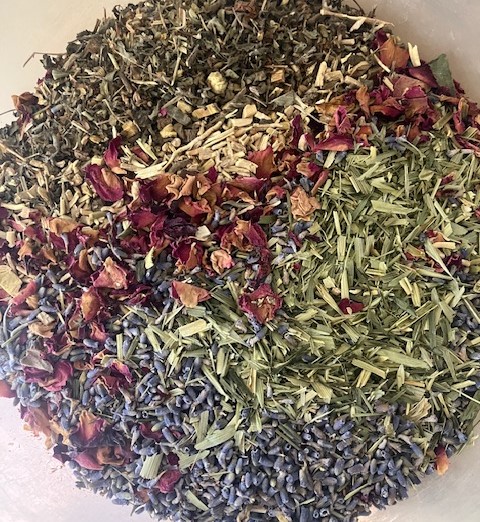
According to The Big Mental Health Report 2024, 1 in 4 people will experience a mental health problem at some point each year. What is happening to us?
It’s complex, and it goes beyond St John’s Wort or a pill.
Let’s look a little more deeply into our internal chemistry. There is enough material to write a book on the subject, so please forgive my brevity in this blog.
The neurotransmitters involved in mood include serotonin, dopamine and norepinephrine, so taking care of these is key. 90% of our serotonin is produced in the intestine, and there is a strong association between a healthy gut microbiome and serotonin levels. You can support your gut microbiome by eating probiotic foods like kefir and kimchi, prebiotic foods like a wide range of vegetables, and also by growing your own vegetables, but not washing them too well.
Working with soil is excellent for our mental health. Research has shown that a soil based organism called Mycobacterium vaccae, triggers the release of serotonin. No doubt there are millions of other healthy soil organisms that also maintain our homeostatic balance.
Foods such as cheese, chicken, fish and sunflower seeds are rich in tryptophan, which is converted into serotonin. We also need vitamin B6, found in whole grains, eggs, potatoes and peas, to make that conversion. The amino acid Tyrosine is converted into dopamine and norepinephrine. Tyrosine rich foods include soy, almonds, avocados, bananas and cheese. It is clear that we are talking about unprocessed, healthy foods.
This is very important because it turns out that there is a strong association between inflammation and brain disorders such as depression and Alzheimer’s Disease. Highly processed foods are very inflammatory. Try to stick to organic foods and cook them yourself. Eating masses of fruit and vegetables mops up free radicals which cause the inflammation.
Our hormones affect our mood too. Cortisol, oestrogen and testosterone imbalances can all contribute towards depression. Chronic stress will lead to elevated cortisol levels in the brain, which may impair mood and cognitive function, and this loops back to cause more depression. Low oestrogen leaves women feeling depressed with poor cognitive function, whilst high oestrogen can make women feel irritable and agitated. Men with declining testosterone may experience mood swings or low mood. Our hormones can be supported with specific foods and medical herbs.
When I looked into recreational drugs – I was shocked. Did you know that cocaine can cause brain cells to self-cannibalize, eating themselves from the inside out?(1) Stress hormones like cortisol may also induce neural atrophy.
What can we do? You can see that there is plenty of scope for a herbalist to help you, but you can really help yourself at home too.
- Cook for yourself using organic if at all possible. Do everything you can to avoid chemicals. Eat plenty of vegetables, healthy fats, proteins, and good quality carbohydrates like porridge oats and root vegetables.
- Keep your blood sugar levels even by eating three meals a day – don’t skip meals, because this spikes your stress and cortisol. Intermittent fasting doesn’t work for everyone.
- There is plenty of evidence which points to the healing effects of just being in nature, listening to the wind in the trees, the birds, playing with your dog.
- Connect with people, animals, plants, the stars, Mother earth.
- Switch on some music and have a personal rave. It’s quite fun to go a bit bonkers for a few minutes on your own. It burns off a few calories, and raises those molecules of joy.
(1)^ What Are The Effects of Cocaine on The Brain? (American Addiction Centers website)
